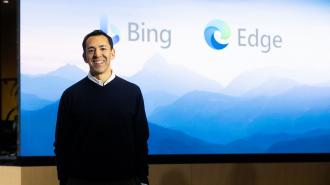On February 7, Microsoft held a surprise event during which it announced plans to integrate the popular AI tech in ChatGPT into its Bing search engine — impressing many, but surprising practically no one.
What was unexpected, though, was the news that it would also be incorporating the tech directly into its Edge web browser — giving users an “AI copilot” to assist them everywhere on the internet.
The background: If today happens to be the first time you’ve used the internet in three months or so, you might not know that ChatGPT is the hottest thing on it.
Released in November 2022, the AI chatbot, developed by research lab OpenAI, is trained to respond to prompts with human-sounding conversational text, but also computer code, poetry, recipes, and more. With more than 100 million users, it’s now the fastest growing consumer app in history.
Chat lets you query the AI without having to leave whatever page you’re on.
The backer: Microsoft invested $1 billion into OpenAI in 2019 and another $2 billion in 2021. In January 2023 — two months after ChatGPT arrived on the scene — it announced another $10 billion investment in the startup.
Weeks prior to the funding announcement, The Information reported that Microsoft planned to integrate ChatGPT’s tech into Bing — instead of just responding to queries with a list of links, the search engine would be able give users helpful answers directly, written in conversational text.
The latest: The integration of ChatGPT into Bing was only part of the big news announced at Microsoft’s event.
The company also demonstrated two AI features for Edge, its successor to the Internet Explorer web browser, that will soon be accessible in the browser’s sidebar.
“Just like that, I’ve created a post.”
Yusuf Mehdi
One Edge AI feature, “Chat,” lets you query the AI, just like you would on the Bing website, but without having to leave whatever page you’re on.
Microsoft says you can ask the AI to summarize a lengthy financial report on the page you’re viewing, for example. You could even ask for a chart comparing it to the financials of another company, and the AI will fetch the information it needs from elsewhere on the web.
Just like with the new Bing search engine, the Edge AI will cite the pages it sources information from — but it will be up to the user to decide whether the information is credible or not.
The other Edge AI feature, “Compose,” can be used to generate new content — like emails or social posts. During the February 7 event, Yusuf Mehdi, Microsoft’s corporate VP and consumer CMO, demonstrated how that feature could be used to create a new LinkedIn post.
After starting the post from their LinkedIn page, a user would just click “Compose” in the sidebar and enter a prompt for the post. They could then choose a tone (e.g., enthusiastic, professional), a length, and a format before clicking the “generate” button.
“Just like that, you get a little draft,” said Mehdi. “I can edit it, and then with one click, it copies right over into my post dialogue. I can add some hashtags to get it some juice, and just like that, I’ve created a post.”
Looking ahead: Microsoft says the new Edge AI features will be available to millions of people in the coming weeks — those interested in accessing them as soon as possible can join a waitlist.
“We’re excited to put the new Bing and Edge into the real world to get the critical feedback required to improve our models as we scale,” Mehdi wrote in a blog post — no word on whether the AI helped him craft it.
We’d love to hear from you! If you have a comment about this article or if you have a tip for a future Freethink story, please email us at [email protected].






